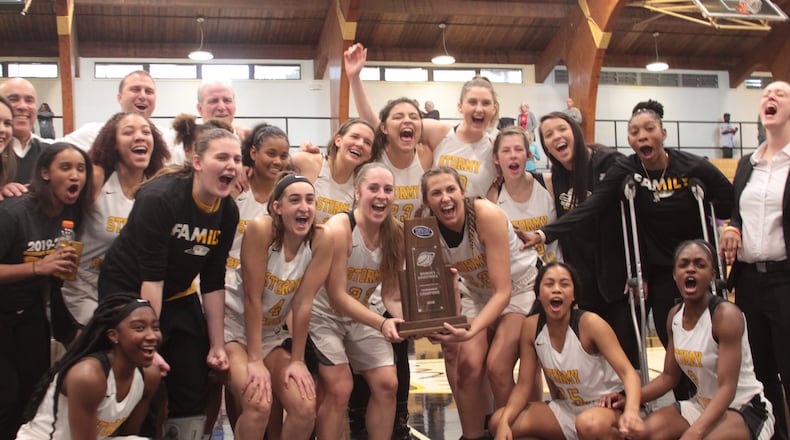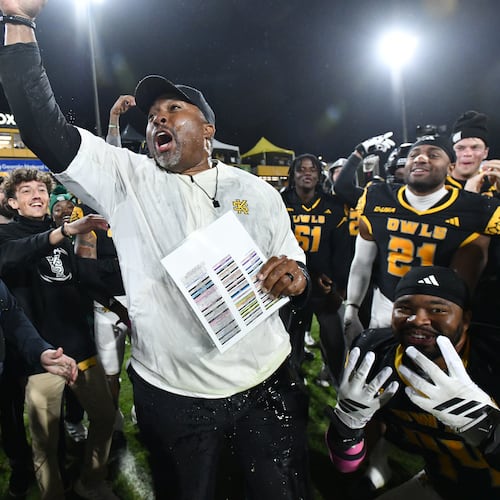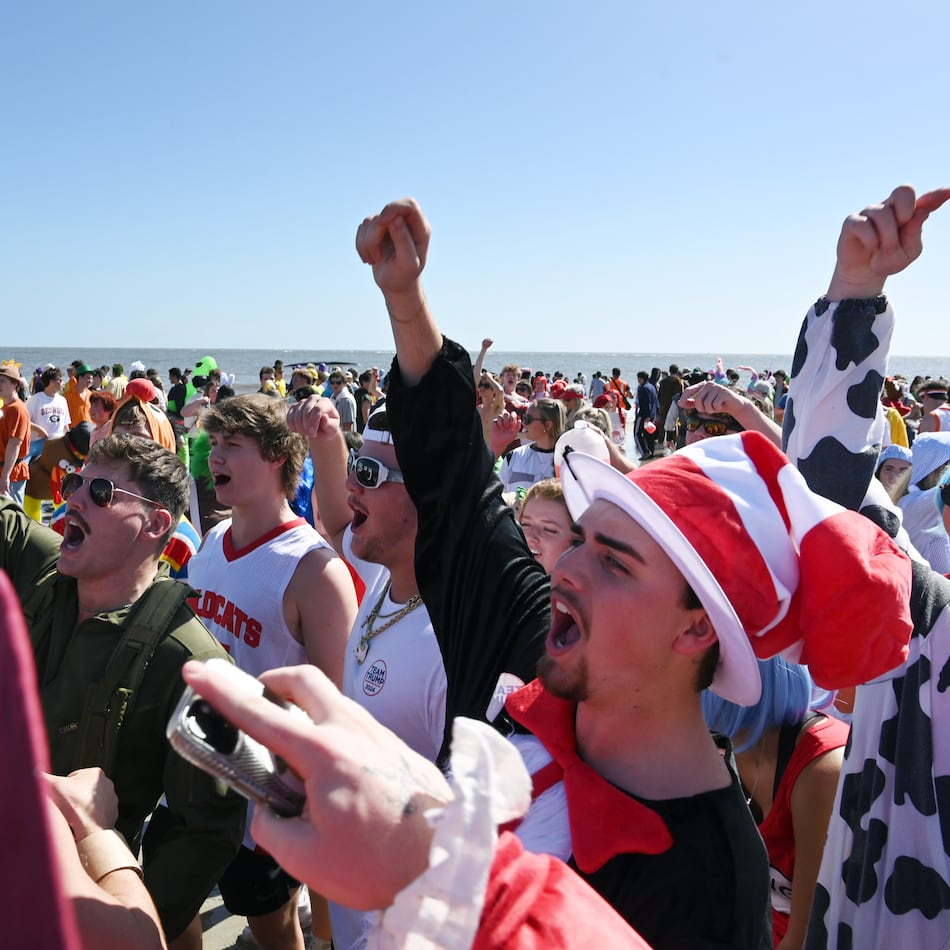March 12 began as well as could be hoped for the Oglethorpe University women’s basketball team.
The Stormy Petrels, in the Sweet 16 of the Division III tournament for the first time since 2009, had run through a crisp practice at Bowdoin College in Maine. That was followed by a sightseeing trip to a nearby lighthouse.
Now the team was headed to Freeport, home to a mammoth shopping outlet complex that includes the L.L. Bean flagship store. Oglethorpe, a liberal-arts college of about 1,400 students in Brookhaven, was to play Whitman College the following day at Bowdoin.
Then, the bus pulled to the side of the road, and coach Alex Richey and athletic director Todd Brooks, who had been following the bus in their car, stepped aboard.
“And just the look on their faces, we knew what had happened,” senior guard Morgan Grindle said.
As college athletes, Grindle and her teammates had been following the news related to the spread of the coronavirus and the decisions that sports leagues were making to help curb the pandemic. The NCAA already had made the decision to play its tournament games with attendance severely restricted. However, players had been assured earlier that day that the tournament would go on. From her seat on the bus, reading her coach’s body language, Grindle knew the plug had been pulled.
“We all definitely looked around at each other and tears just started to fall,” Grindle said.
Grindle and her teammates played far from the spotlight and trappings of Division I athletics. The Petrels’ average home attendance this season at Dorough Field House was 275. There are no athletic scholarships in Division III. In only the rarest of the exceptions do Division III athletes go on to compete professionally. They mostly play for the joy of sport and competition and for each other.
The tears that rolled down the cheeks of Grindle and her teammates testified that their heartbreak was no less deep. A good case can be made that no college team in the state of Georgia had more at stake when its season was ended prematurely by the emergence of COVID-19.
The Petrels were on a joyride that few who have ever played in any organized sport have been privileged to experience, having amassed a record of 29-1 and soaring along on a 27-game winning streak. They were a mere four wins away from celebrating a national championship, which would have been only the third NCAA basketball championship won by a Georgia school.
“It was just a shock,” junior center Savannah LeGate said. “And especially going from the high. It was unreal. It felt like we were in an alternate reality. It didn’t feel real at all.”
High level of competition
Perhaps the first thing to know about Division III sports is that it’s not glorified intramurals. Certainly, the athletes on the whole don’t measure up physically with their Division I counterparts at schools such as Georgia and Georgia Tech. But it’s also not an assemblage of clumsy nerds who couldn’t get off the bench in high school.
Grindle, for example, was an all-county and all-region player as a senior at North Forsyth High, but came off the bench for Oglethorpe. LeGate received multiple Division I scholarship offers as a high schooler in Nashville, Tenn., but chose to play at a lower level to enjoy a more balanced college experience.
Richey, in his sixth season as Oglethorpe’s coach, estimated that about half of his team was recruited to play at either the Division I or II level.
“The competition level is a lot higher than most people would think, especially when you get into postseason play,” LeGate said.
Going into the season, after reaching the NCAA tournament each of the previous two seasons, LeGate had questions about the team’s capacity after losing a strong senior class. But joining the team for preseason pickup games, including the freshmen, “I was like, ‘Oh, my God. We’re really good.’”
LeGate was ultimately right, though not at first. In the third game of the season, the Petrels lost 77-61 to Emory & Henry (not to be confused with Emory) in a four-team tournament.
“It was one of those games where you’re like, who is that out there? That is not us,” LeGate said. “And it was just horrible.”
After getting lectured following the game, Richey put the team through a rigorous practice the following morning with an afternoon game to follow. Richey called it a turning point of the season. Oglethorpe won by 20, and Richey said he never had a problem with attitude or work ethic for the rest of the season.
“I felt like this team this year was the most selfless a group could be,” Richey said. “The kids could not have cared less who scored the points, who got the minutes, who got the shots. All they cared about and valued was the relationships they had with one another and the trust they had with one another, and that led to the wins.”
Infusing that selflessness into an aggressive defensive style and superior depth, Oglethorpe rifled through the Southern Athletic Association, winning its 14 league games by an average of 20 points. Along the way, Richey encouraged players that they could achieve far more than their goal of making to the Sweet 16. They could win it all.
Players were dubious at first. The national championship?
But, “as the year started going, I was like, we can totally get up there,” LeGate said.
Oglethorpe’s season appeared to take a disastrous turn, however, when the team’s best player (guard Taylor Smith) tore her ACL in the final regular-season game of the season. But, playing for Smith, the Petrels tore through the conference tournament, winning all three games by double digits, with LeGate leading the way and earning tournament MVP honors.
“To win by that much and play as well as we did, any doubts I had (about playing without Smith) were squashed,” LeGate said. “I was like, we’re still in this.”
Before the start of the NCAA tournament, fueled by a slight by a website that covers Division III basketball (it called Oglethorpe the team “most likely to disappoint” in its quarter of the bracket), the Petrels won in the first and second rounds to extended their winning streak to 27 games.
“I felt like just like anybody else who was in that position,” Richey said. “We had just as good a shot as anybody to win the whole thing.”
As the team wrapped up practice in Maine, any doubts about Richey’s encouragement to aim for a national title were gone.
“Everything felt so real, like it was finally paying off,” LeGate said.
Powerhouse in the making
The season was a fulfillment of Richey’s vision. A Centennial High grad who played for the Oglethorpe men’s team when the women’s team reached the Final Four in 2009, Richey knew well what could be accomplished when he was hired in 2014 at the age of 24 following two seasons as a men’s assistant coach.
He uses the same buzzwords that his Division I counterparts do in describing the foundations of his team’s success – family culture, high-character kids, competitiveness, player development, administrative support. To prospective athletes being recruited at higher levels, he sells Atlanta, the Oglethorpe education and a basketball experience that can allow for team members to have a life away from the court. LeGate, for instance, is the vice president of her sorority and, before the coronavirus, was planning to go to England this summer on a study-abroad trip.
“Athletics is a big part of their journey, but it’s not going to be the entire thing,” Richey said.
In his tenure, the Petrels have increased their season win total in each of his six seasons and won the conference regular-season and tournament titles in 2018 before repeating it this season.
LeGate describes a coach who can be intense but is at heart a 13-year-old trapped in an adult’s body. She said a turning point of the season was when he did a belly flop into a hotel pool fully clothed to win a $50 bet from one of his assistants, a moment that helped lift spirits after the lone loss of the season. (The flop followed the aforementioned day-of-game practice.)
“He talks to us, like, ‘Yo, yo, yo,’ and we’re like, ‘Oh, my gosh,”’ she said.
The team mirrors his personality, highly competitive on the court but silly off it. Video sessions are rife with players tossing good-natured jabs at each other. Before games, players join in sing-alongs to music from Disney movies and “High School Musical.” Team gatherings to watch “The Bachelor” and “The Masked Singer” are staples.
“This team was kind of goofy,” Grindle said.
That was the team – overflowing with confidence, driven and not above belting out the soundtrack from “Moana” – whose season came to an abrupt end on a bus in Maine.
“I think that they had the opportunity to be very competitive in the next set of games,” said Randolph-Macon coach Carroll LaHaye, whose team was defeated by Oglethorpe in the second round. “They had all the components to contend.”
‘Remember the good’
After the shock of Richey’s announcement about the tournament’s cancellation, the team went ahead to the outlet (“We had some retail therapy,” LeGate said) and then feasted at a steak-and-seafood restaurant. The team flew back to Atlanta the following day, and, with campus closed, players have since scattered.
Players continue to communicate via group text, but with two seniors on the roster and the campus closed, it’s likely they’ll never all be together again. Without a proper ending to the season, LeGate said it was only last week that it finally dawned on her that the year was truly over.
As it usually does, time has washed away the pain of the lost season. While Grindle also lost her chance to experience her final semester on campus and school traditions for seniors such as ringing the bell tower atop Lupton Hall, she’s not dwelling on the end.
“I guess I choose more to remember our conference championship game and how exciting that game was, the first two games that we won in the (NCAA) tournament,” Grindle said. “Just kind of remember the good rather than the ‘what if?’”
About the Author
Keep Reading
The Latest
Featured



